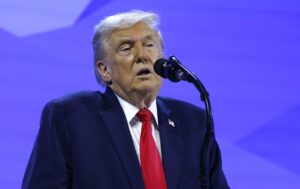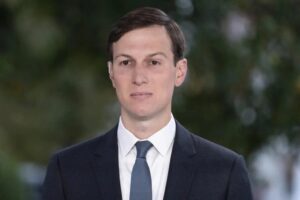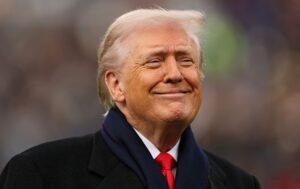
Oil prices fell significantly on Thursday, with traders’ attention shifting back to supply and demand prospects after the hype around Greenland subsided.
Speaking at the World Economic Forum in Davos on Wednesday, US President Donald Trump said that the United States wants to immediately begin negotiations to purchase Greenland from Denmark and does not intend to use military force to seize the island.
Trump later wrote on Truth Social that he had abandoned plans to impose tariffs on a number of European countries in February because he had been able to agree with NATO Secretary General Mark Rutte on a basis for further negotiations on Greenland.
“We are now seeing a decline in the risk premium associated with events surrounding Greenland and the situation in Iran,” said Saxo Bank analyst Ole Hansen.
The price of March Brent futures on the London ICE Futures exchange at 13:15 GMT is $64.42 per barrel, which is $0.82 (1.26%) lower than at the close of previous trading.
WTI crude oil futures for March delivery on the New York Mercantile Exchange (NYMEX) rose in price by $0.76 (1.25%) to $59.86 per barrel.
On Thursday, the market’s attention is focused on the weekly report on energy reserves in the US, which will be released at 7:00 p.m.
Estimates from the American Petroleum Institute (API), published on Wednesday night, showed an increase in US oil reserves last week of 3.04 million barrels.
Traders also continue to monitor the situation in Kazakhstan, where oil production at the Tengiz and Royal fields was suspended this week due to problems with the power distribution systems.

US President Donald Trump, speaking at the World Economic Forum in Davos, reiterated his intention to seek control over Greenland and, commenting on the topic, said: “I’m just asking for a piece of ice.”
According to Reuters and AP, Trump claimed that the US would not use force to obtain the island, while insisting on the need for negotiations and calling Washington’s request a “small request” in the context of the US’s role in ensuring the security of its allies.
Greenland is an autonomous territory within the Kingdom of Denmark. Trump’s statements about a possible change in the island’s status previously provoked a sharp reaction in Europe, where the inadmissibility of a forceful scenario and the importance of respecting sovereignty were emphasized.
The island is interesting for its reserves and prospects for the extraction of critically important minerals, including rare earth elements, which are important for high-tech industries and energy transition.
Greenland is also associated with the planet’s largest reserves of fresh water in the form of ice – together with Antarctica, the ice sheets contain more than 99% of the Earth’s fresh ice.
Its key advantage is its geography: its location on Arctic and North Atlantic routes, including the GIUK (Greenland-Iceland-United Kingdom) area, which NATO considers a strategic maritime “corridor” between the Arctic and the Atlantic.

US President Donald Trump has announced the introduction of 10% tariffs against Denmark, Norway, Sweden, France, Germany, the UK, the Netherlands, and Finland from February 1, Clash Report reports.
“Starting February 1, 2026, all of the above countries (Denmark, Norway, Sweden, France, Germany, the United Kingdom, the Netherlands, and Finland) will be subject to a 10% tariff on all goods shipped to the United States of America. On June 1, 2026, the tariff will be increased to 25%,” he wrote on the social network Truth Social.
Trump noted that these countries are directly opposing US attempts to take over Greenland.
“These tariffs will be assessed and payable until an agreement is reached on the complete and absolute purchase of Greenland,” he added.

The Norwegian Nobel Institute has stated that the Nobel Peace Prize cannot be transferred, shared, or revoked after the winner has been announced, commenting on statements by Venezuelan opposition leader Maria Corina Machado about her willingness to “transfer” or “share” her award with US President Donald Trump.
The institute emphasized that “the decision to award the prize is final and remains in force forever,” and that the rules of the Nobel Foundation do not provide for a mechanism for transferring the award to another person.

The Serbian Economist reports that Prindon Sadrija, the husband of Kosovo President Vjosa Osmani, called on Trump’s son-in-law Jared Kushner to move the Trump Hotel project to Pristina, which his organization had previously rejected in Belgrade.
Sadrija wrote on social network X that the withdrawal from the Belgrade project confirms the thesis that “significant projects should unite, not divide,” and suggested “moving this idea to Pristina” with the transformation of the capital’s Grand Hotel into Trump Hotel.
The statement came amid reports that Affinity Global Development, linked to Kushner, has withdrawn from plans to build a hotel and residential complex on the site of the former General Staff building in downtown Belgrade, which was damaged during the 1999 NATO bombing and has been the subject of public controversy over memory preservation and cultural heritage status.
The company notified the decision to withdraw from the project after months of protests and amid a legal scandal surrounding the removal of the site’s protected status, for which the Serbian prosecutor’s office sought to prosecute a number of officials.
In Serbian statements, the losses are estimated at “at least 750 million euros” – a figure that Serbian President Aleksandar Vucic and representatives of the ruling party have voiced, linking the investor’s withdrawal to the pressure of protesters.
At the same time, earlier publications on the parameters of the project estimated the investment at about $500 million.
https://t.me/relocationrs/1999

US President Donald Trump has signed a new presidential proclamation that expands and tightens restrictions on foreign nationals entering the country, bringing the number of countries subject to full or partial bans to 39, according to the text of the document and explanations from the White House.
According to the proclamation, the previously existing restrictions on the entry of citizens of 12 “high-risk” countries remain in full force: Afghanistan, Myanmar (Burma), Chad, the Republic of Congo, Equatorial Guinea, Eritrea, Haiti, Iran, Libya, Somalia, Sudan, and Yemen. Entry into the US for citizens of these countries in immigration and most non-immigration visa categories is suspended, except for individual exceptions and humanitarian cases provided for by law and the document.
A complete ban on entry also applies to citizens of five additional countries—Burkina Faso, Mali, Niger, South Sudan, and Syria—as well as to individuals traveling on travel documents issued or certified by the Palestinian Authority. The decision is justified by high visa overstays (cases of exceeding the permitted period of stay), security concerns, and the unwillingness of the authorities of these countries to accept deported citizens.
Separately, the proclamation moves Laos and Sierra Leone from partial restrictions to a de facto total ban: entry into the US for citizens of these countries under both immigrant and major non-immigrant visa categories (B-1/B-2, F, M, J) is suspended.
At the same time, the document eases restrictions for Turkmenistan: against the backdrop of “significant progress” in cooperation with Washington, restrictions on the issuance of non-immigrant visas to citizens of this country are being lifted, but the ban on immigrant entry remains in place.
In addition, partial restrictions are being introduced for 15 countries: Angola, Antigua and Barbuda, Benin, Côte d’Ivoire, Dominica, Gabon, Gambia, Malawi, Mauritania, Nigeria, Senegal, Tanzania, Tonga, Zambia, and Zimbabwe. For citizens of these countries, entry into the US as immigrants and as holders of B-1/B-2, F, M, and J visas will be restricted, and the validity of other categories of visas issued by US consulates is expected to be reduced “to the extent permitted by law.” The reasons cited are high rates of visa violations, the existence of “citizenship for investment” programs without residency requirements, and problems with returning illegal migrants to their home countries.
Partial restrictions remain in place for a number of countries that already appeared in previous versions of the high-risk migration regime, in particular Burundi, Cuba, Togo, and Venezuela, according to White House documents.
The US administration emphasizes that the goal of the updated system is to “increase security and immigration control” and to encourage foreign countries to strengthen data exchange, reduce visa violations, and more actively accept deported citizens. The document provides for the possibility of revising the list of countries and the nature of restrictions based on the results of regular assessments by the State Department and the Department of Homeland Security.
According to observers, the Trump administration’s next step in the field of migration may be to further tighten checks on applicants from “at-risk” countries, expanding the practice of targeted restrictions on certain visa categories (including work and student visas), and attempting to link the easing of restrictions to agreements on security and cooperation on the return of illegal migrants. At the same time, experts expect legal disputes over the new measures to intensify and be challenged in federal courts, as has been the case in previous years.
https://expertsclub.eu/tramp-posylyuye-migraczijnu-polityku-chogo-ochikuvaty-dali/